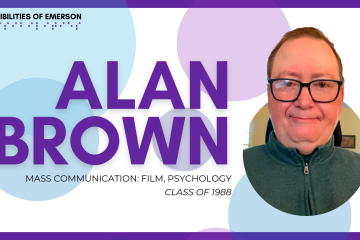Sooner or later every college graduate or working professional has to face some sort of leap. It’s the moment you realize that you might be applying to a position that feels out of your depth or you might be getting into something you’re not entirely comfortable with because of a lack of experience.


Alexa McMahon ’11 knows exactly what that can feel like. Working as the projects editor for features at The Washington Post, she’s seen the highs and lows of pursuing a career in journalism and understands the value of persistence. We spoke with Alexa to learn more about her journey to the Post and what kind of wisdom she’s learned along the way:
What attracted you to your current position?
“I truly enjoy collaborating with multiple departments of the newsroom to produce the best digital storytelling. In my previous positions as a features digital editor at The Washington Post and features producer at The Boston Globe, my favorite task was managing longform features with multimedia elements. This involved coordinating with photo, design, graphics, engineering, social and/or video. In my current position, I get to collaborate and coordinate as my full-time job. From brainstorming to promotion, I see every element of a story through to the end. I have the privilege to experiment with new forms of storytelling.”
What excites you about working for The Washington Post specifically?
“The Washington Post lets its staff take risks. We pursue ideas for the sake of journalism; we aren’t always constrained by the numbers. We learn from our past successes and failures and apply that to future endeavors. I appreciate the Post is bound to its ethical standards, maintaining the newsroom’s mission to serve the public.”
How did your time at Emerson help prepare you for this position?
“At Emerson, there is an emphasis on professionalism that has followed me through my career. I had completed four internships when I graduated, which greatly helped me transition into a full-time work environment. I learned how to juggle multiple responsibilities and activities, especially during my time as a resident assistant where I established my leadership skills.”
What was the biggest challenge you’ve faced in your career?
“There have been a lot of career challenges in the last several years. The one that sticks out for me was getting a full-time, staff position at the Boston Globe. I applied and interviewed for many jobs that I didn’t get. I was frustrated and losing faith in a journalism career. There was a time that I was working night and day shifts in the same week as a part-time employee. I honed my digital skills in the several positions I held the year or so following graduation — Boston.com homepage producer, BostonGlobe.com homepage producer, Spotlight correspondent and research assistant for a Wall Street Journal reporter’s book. My eagerness to participate in new initiatives like the launch of BostonGlobe.com is how I ended up with a full-time position one year after the site launch.”
If you could go back in time and give yourself any piece of advice, what would it be?
“Don’t sell yourself short. You don’t have to 100 percent qualified to apply for a job. Go for positions you think are out of your reach. It’s important to take risks and realize you aren’t going to excel at everything. It took me a long time to internalize that you don’t have to do every task perfectly to be a good fit for a job; there will always be a learning curve in a new position or skill. It’s not a bad reflection on you as a journalist if something takes time or mistakes are made.”
Do you have any advice for current students or recent graduates?
“I always thought that people who had an accomplished career had it all figured out. I quickly realized that’s far from the truth. Keep in mind that everyone has strengths and weakness. Respect and learn from senior staff, but don’t let that stop you from expressing ideas or opinions when working with them.
Don’t run away from something because it isn’t one of your strengths. There is always time to learn a new skill.
It’s important to work hard, but it’s also important to be true to yourself. I found that professional and personal aspects of my life made me happy, not one or the other. However don’t expect there to be a perfect balance.”


